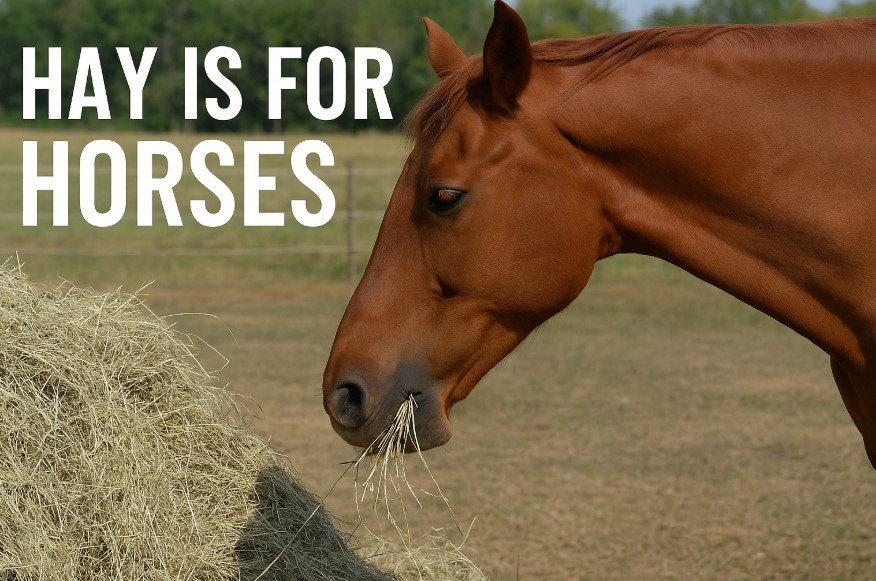Lifestyle
Hay is for Horses: What It Really Means and Why People Say It

The phrase “hay is for horses” is something many people have heard, often during childhood. It sounds simple, but it actually has a long history and a few different meanings. Some people use it in a fun or teasing way, while others say it to correct manners. In this article, we will explore the background of this saying, what it really means, and how people use it today.
Where Did the Saying Come From?
The expression “hay is for horses” has been used in English-speaking countries for many decades. While it is hard to find the exact year it first appeared, it became popular in the early 1900s as a way to remind children to be polite. Back then, many families placed a strong focus on using proper manners and polite greetings.
If a child said “hey” to get someone’s attention, an adult might respond with, “Hay is for horses,” as a gentle reminder that “hey” is not a proper way to start a sentence. It was their way of saying, “Don’t say hey. Say hello or excuse me.”
This led to the creation of the hay is for horses saying, which is still heard today, mostly in English-speaking families.
The Meaning of the Saying
So what is the hay is for horses meaning? It simply points out that “hay,” while sounding like “hey,” is actually food for horses. The phrase is a pun—a play on words—because “hey” is often used casually to get someone’s attention, while “hay” is something animals eat.
Parents or teachers would say it to remind kids not to speak too casually or rudely. It often continues like this:
“Hay is for horses, and not for people like you.”
Or the more extended version:
“Hay is for horses, better for cows. Pigs don’t eat it, they don’t know how.”
There are several variations, but they all start with “hay is for horses.” Over time, the phrase became something playful that children and adults say to each other.
The Full Saying and Its Variations
The hay is for horses full saying can have different endings depending on the region or family tradition. Some common versions include:
- “Hay is for horses, not for people.”
- “Hay is for horses, better for cows, pigs don’t eat it because they don’t know how.”
- “Hay is for horses, straw is cheaper, grass is free, buy a farm and get all three.”
These versions are often used in a joking or silly way. They may not always make complete sense, but they are meant to be playful responses when someone says “hey” too loudly or without manners.
Is the Phrase Still Used Today?
Yes, but not as often as before. In the past, it was more common for adults to correct children using this phrase. Nowadays, it is sometimes used by parents, teachers, or even older siblings, but less frequently. Still, it remains part of English culture and shows up in jokes, stories, and even online posts.
Some people also say it when they want to lighten the mood or make someone laugh. It is not used in serious situations but more in casual conversations among family or friends.
Why Do People Say It?
People say it for a few reasons:
- To remind others to use polite words like “excuse me” instead of “hey.”
- To playfully correct someone.
- As a joke between friends or family.
- To teach children about good manners.
Sometimes, people say it just because it is fun or because they grew up hearing it. It brings a bit of humor to the moment and often makes the listener smile.
Final Thoughts
The phrase “hay is for horses” is more than just a comment about animal food. It has been used for generations to teach politeness in a light-hearted way. Whether used seriously or jokingly, it remains a part of everyday language for many families.
The hay is for horses saying may sound old-fashioned, but it still carries a message. It tells us that language matters and how we speak to each other makes a difference. If someone says “hey” and you respond with “Hay is for horses,” you are continuing a tradition that goes back many years.
So the next time someone yells “hey,” and you want to reply with something fun or polite, remember the hay is for horses full saying—and pass it along to the next generation.
Check out: What is The Meaning Of Cold Hands And Feet?
-

 Entertainment1 month ago
Entertainment1 month ago123Movies Alternatives: 13 Best Streaming Sites in 2026
-

 Entertainment2 months ago
Entertainment2 months ago13 Free FMovies Alternatives to Watch Movies Online in 2026
-

 Entertainment1 month ago
Entertainment1 month ago13 Flixtor Alternatives to Stream Free Movies [2026]
-

 Entertainment1 month ago
Entertainment1 month agoGoMovies is Down? Here are the 11 Best Alternatives






